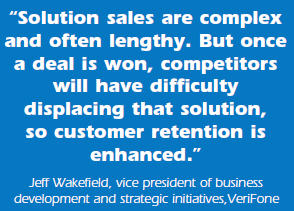Driving Value In The Channel With Services And Solutions
By Jeff Wakefield, vice president of business development and strategic initiatives,VeriFone
An end-to-end strategy to answer your customer’s needs
Managed services and solutions are increasingly important in supporting the commercial needs of merchants, especially amid the growing complexity of payment-related technologies. There has never been more choice or flexibility for how to reach, attract, and retain customers, but neither have merchants faced as much uncertainty about what technologies to use, how to integrate those technologies, or how to maximize their value to differentiate or grow revenues. Companies that can help merchants address these pain points holistically will have a much better business advantage over those who cannot.
 Whether a manufacturer, ISV, reseller, VAR, or ISO, this is a great time to evaluate your portfolio and determine how a services or solution strategy might augment your own business while driving significantly more value for your customers. Merchants want to focus on running their businesses and are most likely not equipped nor inclined to become experts on all facets of payment, social media, loyalty, or customer relationship strategies. Nor are they willing, or prepared, to manage a significant number of vendor relationships to address these needs. Companies that have the flexibility to bundle or unbundle offerings based on the unique needs of a particular merchant are in a great position.
Whether a manufacturer, ISV, reseller, VAR, or ISO, this is a great time to evaluate your portfolio and determine how a services or solution strategy might augment your own business while driving significantly more value for your customers. Merchants want to focus on running their businesses and are most likely not equipped nor inclined to become experts on all facets of payment, social media, loyalty, or customer relationship strategies. Nor are they willing, or prepared, to manage a significant number of vendor relationships to address these needs. Companies that have the flexibility to bundle or unbundle offerings based on the unique needs of a particular merchant are in a great position.
VeriFone — historically a products company — has found that managed services and solutions are proving increasingly effective at delivering more overall value to its customers and partners. Individual products still form the foundation of VeriFone’s offerings, but because of the growing complexity noted before, merchants are increasingly in need of, and more receptive to, comprehensive solutions.
Considering the breadth of technologies that a merchant faces today — emerging payments, loyalty and rewards, mobile wallets, analytics, and EMV to name a few (not to mention PCI compliance) — VeriFone saw an opportunity to help merchants leverage these services while managing the integration, security, transaction routing, and service provisioning on our platforms. The result, VeriFone Point, is a payment-as-a-service solution that helps merchants stay current with the market without having to take on complex integrations, manage multiple vendors, or deal with cost volatility across providers. For example, VeriFone Point provides ease of integration for ISVs and helps remove their POS software from PCI scope — helping them to ‘get out of the payments business.’
With managed services, vendors have an opportunity to shift their business from that of a single-source provider, to that of a consultative advisor providing ongoing problem solving, rather than relying solely on discrete sales. They may also choose to further specialize or differentiate by developing services and solutions aligned to specific segments or verticals — rather than competing in multiple markets with moderate results, they have the potential to frame a services portfolio around market dominance.
Solution sales are complex and often lengthy. But once a deal is won, competitors will have difficulty displacing that solution, so customer retention is enhanced. Additionally, the managed services approach delivers recurring revenue opportunities through long-term engagements and provides a predictable revenue stream.
 Regardless of the specific approach, services and solutions play an important role. As long as vendors think about long-term relationships, driving deep expertise in their core business, and continuously seeking to add value and solve their customers’ problems, they will be on the right path to success.
Regardless of the specific approach, services and solutions play an important role. As long as vendors think about long-term relationships, driving deep expertise in their core business, and continuously seeking to add value and solve their customers’ problems, they will be on the right path to success.
